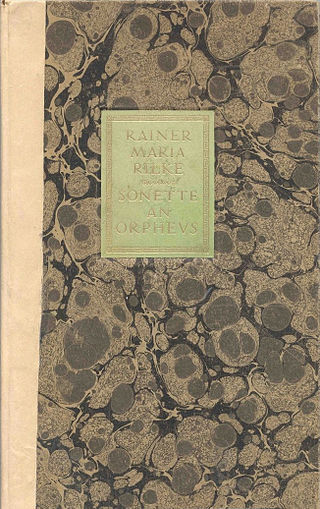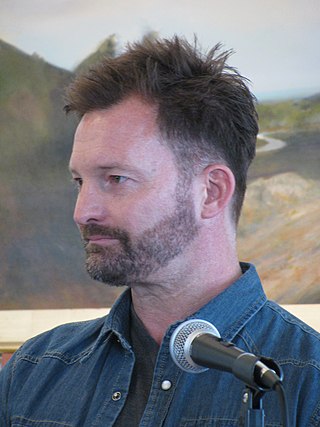Reviews and criticism
Miranda's poetry has been well received. His first collection, Listeners at the Breathing Place, chosen for the Princeton Series of Contemporary Poets, was described as "inviting and impressive" in the Library Journal [6] Maxine Kumin called it "a first book to be proud of," and Miranda "a versatile and sensitive poet." [7] Writing in Poetry, Michael Heffernan called the book "breathtaking." [8]
The Library Journal review of Miranda's second collection, Grace Period, said it was "written with a sure hand," and that Miranda "bears witness" and "surprises us." [9] In a review of Orpheus and Company: Contemporary Poems on Greek Mythology, edited by Deborah DeNicola, David Garza calls the opening to Miranda's poem on Narcissus "insightful and seductive." [10]
Miranda's translation of Rilke's Duino Elegies received wide praise. Robin Skelton, in The Malahat Review, said it "retains the brilliance of the original;" Robert Boyers, in Salmagundi, said, "Nowhere does it read like a translation." Rilke Scholar John Mood called it "the nearest to a definitive Elegies we're apt ever to get in the English language." Jan Freeman, director of Paris Press, said, "No other translation compares to this one." [11] Less effusive, the review in the Virginia Quarterly Review called the translation "admirable," "clear and readable," and "faithful" to Rilke's meaning, but found Miranda's translation "prosaic," and prefers the translation by Harry Behn. [12]
Miranda has not been identified strongly with a single school of poetry; although three of his poems were included in the New Formalist collection Strong Measures, he does not limit himself to traditional forms - in fact, most of his work is free verse. [13]

Robert Lee Frost was an American poet. His work was initially published in England before it was published in the United States. Known for his realistic depictions of rural life and his command of American colloquial speech, Frost frequently wrote about settings from rural life in New England in the early 20th century, using them to examine complex social and philosophical themes.

René Karl Wilhelm Johann Josef Maria Rilke, shortened to Rainer Maria Rilke, was an Austrian poet and novelist. He has been acclaimed as an idiosyncratic and expressive poet, and is widely recognized as a significant writer in the German language. His work has been seen by critics and scholars as having undertones of mysticism, exploring themes of subjective experience and disbelief. His writings include one novel, several collections of poetry and several volumes of correspondence.

Galway Mills Kinnell was an American poet. He won the Pulitzer Prize for Poetry for his 1982 collection, Selected Poems and split the National Book Award for Poetry with Charles Wright. From 1989 to 1993, he was poet laureate for the state of Vermont.

The Sonnets to Orpheus are a cycle of 55 sonnets written in 1922 by the Bohemian-Austrian poet Rainer Maria Rilke (1875–1926). It was first published the following year. Rilke, who is "widely recognized as one of the most lyrically intense German-language poets," wrote the cycle in a period of three weeks experiencing what he described a "savage creative storm." Inspired by the news of the death of Wera Ouckama Knoop (1900–1919), a playmate of Rilke's daughter Ruth, he dedicated them as a memorial, or Grab-Mal, to her memory.
— Opening lines from The Waste Land by T. S. Eliot, first published this year

The Duino Elegies are a collection of ten elegies written by the Bohemian-Austrian poet Rainer Maria Rilke. He was then "widely recognized as one of the most lyrically intense German-language poets", and began the elegies in 1912 while a guest of Princess Marie von Thurn und Taxis at Duino Castle, on the Adriatic Sea. The poems were dedicated to the Princess upon their publication in 1923. During this ten-year period, the elegies languished incomplete for long stretches of time as Rilke had frequent bouts with severe depression—some of which were related to the events of World War I and being conscripted into military service. Aside from brief periods of writing in 1913 and 1915, he did not return to the work until a few years after the war ended. With a sudden, renewed burst of frantic writing which he described as a "boundless storm, a hurricane of the spirit"—he completed the collection in February 1922 while staying at Château de Muzot in Veyras, Switzerland. After their publication in 1923, the Duino Elegies were soon recognized as his most important work.
Edward A. Snow is an American poet and translator.
Rachel Hadas is an American poet, teacher, essayist, and translator. Her most recent essay collection is Piece by Piece: Selected Prose, and her most recent poetry collection is Love and Dread. Her honors include a Guggenheim Fellowship, Ingram Merrill Foundation Grants, the O.B. Hardison Award from the Folger Shakespeare Library, and an Award in Literature from the American Academy and Institute of Arts and Letters.

Stephen Rodefer was an American poet and painter who lived in Paris and London. Born in Bellaire, Ohio, he knew many of the early beat and Black Mountain poets, including Allen Ginsberg, Gregory Corso, Charles Olson, and Robert Creeley. Rodefer was one of the original Language poets and taught widely, including: UNM, SUNY Buffalo, UC Berkeley, UC San Diego, San Francisco State, and the American University of Paris. Rodefer was the first American poet to be offered a Fellowship at Cambridge University.
Alfred Corn is an American poet and essayist.
Willis Barnstone is an American poet, religious scholar, and translator. He was born in Lewiston, Maine and lives in Oakland, California. He has translated works by Jorge Luis Borges, Antonio Machado, Rainer Maria Rilke, Pedro Salinas, Pablo Neruda, and Wang Wei, as well as the New Testament and fragments by Sappho and pre-Socratic philosopher Heraclitus (Ἡράκλειτος).
Patrick Phillips is an American poet, professor, and translator. His 2015 poetry collection, Elegy for a Broken Machine, was a finalist for the National Book Award for Poetry. His poems have appeared in many magazines, including Poetry, Ploughshares, The American Poetry Review, Harvard Review, DoubleTake, New England Review, and Virginia Quarterly Review, and have been featured on Garrison Keillor's show The Writer's Almanac on National Public Radio. He has been a Fulbright Scholar at the University of Copenhagen, and teaches writing and literature at Drew University. Patrick Phillips grew up in Gainesville, Georgia, and now lives in New York City.

José María Valverde Pacheco was a Spanish poet, essayist, literary critic, philosophy historian, and Spanish translator.

Christopher Bakken an American poet, translator, chef, travel writer, and professor at Allegheny College.

Duino Castle is a fourteenth-century fortification located in Duino, near Trieste, Italy, on the cliffs overlooking the Gulf of Trieste.
Martyn Crucefix is a British poet, translator and reviewer. Published predominantly by Enitharmon Press, his work ranges widely from vivid and tender lyrics to writing that pushes the boundaries of the extended narrative poem. His themes encompass questions of history and identity and – influenced by his translations of Rainer Maria Rilke – more recent work focuses on the transformations of imagination and momentary epiphanies. His new translation of Rilke's Sonnets to Orpheus was published by Enitharmon in the autumn of 2012. Most recent publication is The Time We Turned published by Shearsman Books in 2014.
Alfred A. Poulin, Jr. or A. Poulin (1938–1996) was an American poet, translator, and editor noted for his translation of Rainer Maria Rilke's Duino Elegies and the Sonnets to Orpheus. Poulin studied at St. Francis College in Maine, Loyola University in Chicago, Illinois, and at the University of Iowa Writers' Workshop. He later taught as a professor at the State University of New York at Brockport. His translation work focused on translating poetry from French and German into English.

Mischa Willett is an American poet and essayist best known for his work in the poetic elegy and for his academic championship of the Spasmodic poets.









